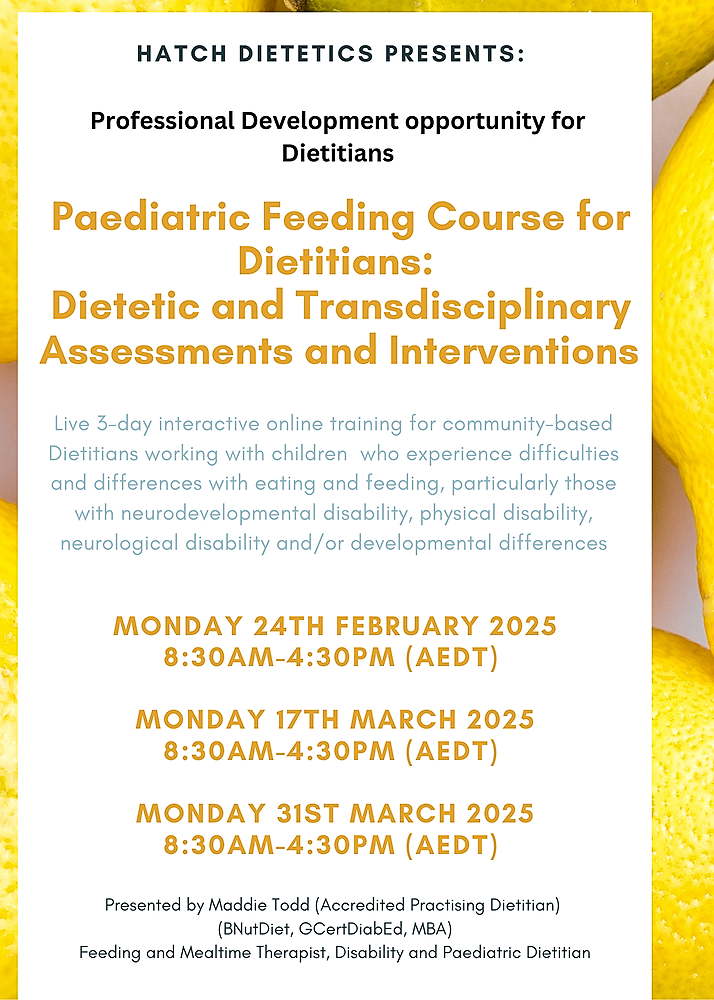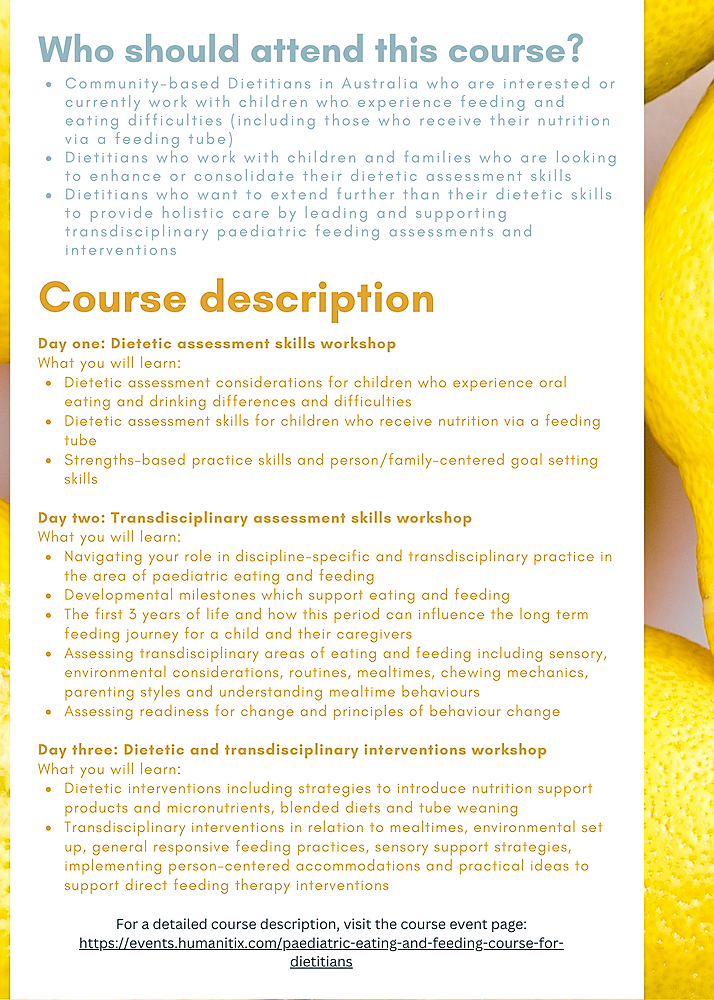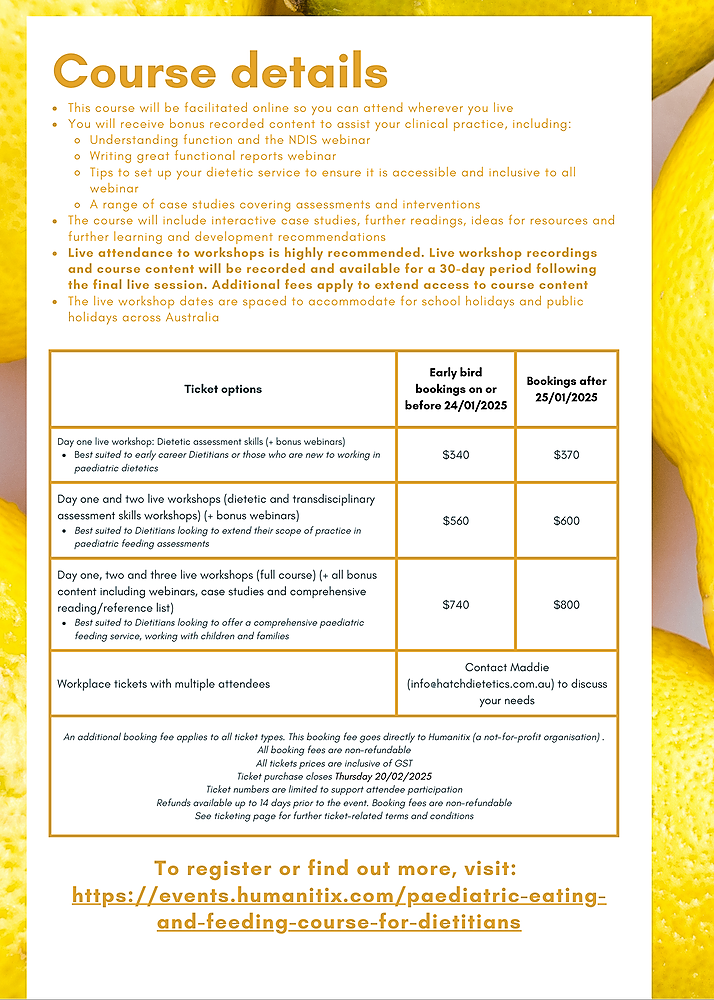Paediatric Feeding Course for Dietitians
Event description
Course description
This professional development course is designed to enhance your skills, confidence and competence as a Dietitian working to support children with feeding difficulties. It has been developed to consolidate and advance your dietetic assessment and intervention skills, as well as extend your scope to offer you knowledge and skills in the transdisciplinary feeding space.
Many courses in paediatric feeding are developed by non-Dietitian healthcare professionals. This course has been developed by a Dietitian exclusively for Dietitians. This means that all the information provided to you will best support your learning and understanding through a Dietitians lens.
It will help you to understand how to assess your own personal scope of practice in paediatric feeding so that you know how you can fit within a paediatric feeding team to best support your clients. It will assist you to know when you can take the lead as a feeding therapist and when a client needs more team members to support them to achieve their goals. It will provide you with models to understand not only the ‘what’ of eating, but the ‘how’, ‘where’, ‘why’ and ‘who with’. This approach to your clinical practice will assist you to work effectively with families to support achievement of their goals.
This course will run over three live sessions and will be facilitated online so you can attend from wherever you are located.
The live sessions will be recorded and available to attendees for a 60-day period from the date of the final live workshop.
The course will include interactive case studies, further readings, ideas for resources and further learning and development recommendations to support your clinical practice.
This course is for Dietitians working in Australia. Enrolment is not open for other allied health professionals. If you are interested in learning with us, please get in touch to discuss your training or supervision needs.
Course objectives
This course is designed to:
- Enhance your confidence in working with children who experience eating and feeding challenges and differences
- Increase your knowledge on how to successfully set up and undertake a complex dietetic assessment with children who experience eating and feeding differences
- Improve your dietetic and transdisciplinary assessment skills and clinical judgement so that your interventions are individualised and designed to succeed
- Assist you to understand your own individual scope of practice and options that are available to extend your dietetic and transdisciplinary skills
- Develop an understanding of the multidisciplinary team and their roles in supporting children with eating, feeding and drinking differences
- Reflect on your skills in how you support families who experience eating and feeding differences
- Support you to understand further areas for learning and develop an individual learning plan so that you can thrive
About the presenter (Maddie Todd)
- Maddie is an Accredited Practising Dietitian from Australia who has specialised in developing and providing clinical services to people with disabilities, and in particular, children who experience eating and feeding differences
- Maddie has significant experience in tube feeding in adults and children, including supporting blended diets and tube wean trials
- Maddie has worked under the NDIS funding model since its inception so have excellent knowledge of the ‘ins and outs’ of the funding scheme. Maddie keeps up to date with the changes to the scheme, and is a strong advocate for people receiving dietetic services to support their function and enhance their quality of life. Maddie has worked at the national level to advocate and influence policy changes within the NDIS so that people with disabilities can receive dietetic services and nutrition support products
- Maddie adopts a responsive feeding approach and has a strong focus on supporting positive feeding relationships and eating experiences
- Maddie is the proud owner of Hatch Dietetics, a busy private practice specialising in working with children and people with disabilities
- Maddie has successfully started and grown a thriving disability dietetics service and specialist feeding team within a large not-for profit business
- Maddie loves teaching and educating other health care professionals, and is very passionate about people with disabilities receiving the highest quality dietetic services and living their best lives
Course content
Session 1: Clinical dietetic assessment for children with eating, feeding and mealtimes difficulties
- Understanding the Australian context for children with feeding differences
- Models of assessment for children with feeding differences
- How to use a strengths-based approach when undertaking your dietetic assessment
- Tips to conduct your dietetic assessment so you can obtain all the clinical information required to work effectively with children and families
- Detailed dietetic assessment (ADIME approach) for children who eat orally and/or are provided nutrition via feeding tube. Education topics include:
- Anthropometry: Assessing growth and understanding when deviations in growth may be occurring, taking anthropometric measurements, understanding the use of standard and specialised growth charts, alternative height measurements and equations, indicators of malnutrition, anthropometric equipment, practical tips for taking accurate anthropometric measurements
- Biochemistry: Specific considerations for children with disabilities, practical tips on attaining biochemistry in children
- Nutrition-Focused Physical Findings: Assessing causes for elevated or low appetite, energy levels to maximise nutritional intake, nutrition-focussed physical assessment, oral cavity considerations, pica, bowels, pressure injuries, hydration, red flags for pharyngeal dysphagia, screening stoma sites in children who are fed via tube, tube feeding assessments, screening seating and positioning
- Client history: Ecomaps, common medications for children with disabilities, medication considerations in relation to diet and function, social circumstances, restrictive practices, considerations around autonomy and decision making
- Diet: Creative approaches for obtaining dietary information, practical tips on how to collect dietary information, assessing responsive feeding practices, tips for assessment with children requiring texture modified diets, blended diet assessment considerations, mealtime observations and assessments
- Indirect assessment: Using Z scores, estimating nutritional requirements in children with specific diagnoses
- Person-centered goal setting
- Developing your learning plan
The session will conclude with a range of resources to support your clinical assessments and practice.
Session 2: Advancing your dietetic practice – developing your transdisciplinary knowledge and skills in relation to paediatric feeding
This session will support you to extend your dietetic scope of practice to be able to complete transdisciplinary paediatric feeding assessments. This will support you to deliver transdisciplinary feeding interventions and know when and who to involve in a clients multidisciplinary feeding team. You will be encouraged to reflect upon your own personal scope of practice and build your multidisciplinary networks to ensure the highest quality care for your clients.
The session includes the following topics:
- Understanding transdisciplinary practice in paediatric feeding and where and how a Dietitian can be part of a multidisciplinary team (as well as take the lead as a feeding therapist)
- Paediatric feeding disorder and ARFID diagnostic criteria – exploring the diagnosis, understanding similarities and differences
- Understanding the early feeding journey and feeding progression for infants and children so that you can appreciate how the feeding journey can impact both caregivers and children
- Typical feeding development from birth to 36 months – feeding reflexes, physical development, oral motor structures and development, gross and fine motor development and, social and emotional development
- Oral phase dysphagia – understanding the basic mechanics of chewing and red flags for oral motor delays, so that you can undertaking screening and know who to refer to
- Sensory aspects of feeding and sensory regulation and processing differences
- Feeding equipment options for children with feeding challenges to support their skills and independence
- Assessing mealtimes – environment, routines, structure, understanding factors that support a child to do their best eating
- Reviewing exposure to a variety of food
- Understanding parenting styles and the feeding dynamics
- Understanding and reviewing feeding cues and caregiver responses
- Mealtime behaviours - what are these telling us?
- The feeding relationship and responsive feeding practices
Session 3: Dietetic and transdisciplinary feeding interventions
This session will include a range of case studies to support you to develop your confidence in supporting both dietetic and transdisciplinary feeding interventions. The session includes the following topics to support your learning:
- Understand the roles of other essential feeding team members so that you know how to best support your clients
Dietetic-specific interventions:
- Maximising dietary intake and nutrition in children with feeding differences
- Practical tips on introducing nutrition support products and micronutrient supplementation
- Blended diets, and,
- Supporting feeding tube weaning trials
Supporting individualised transdisciplinary feeding interventions:
- Creating mealtime and eating opportunities that promote body safety for children
- Creating harmonious, calm or neutral mealtimes
- Mealtime structures that work with a child's appetite
- Direct feeding therapy interventions – understanding when it may (or may not) be appropriate/necessary to work directly with a child to undergo feeding therapy, broadening the lens of what feeding therapy can entail to best support children, safe food exposure activities for tube fed children
- Strategies to support caregivers in their feeding partnership role
- Exploring sensory-based feeding therapy interventions
- Guiding principles of neurodiversity affirming clinical practice
- What to include in your feeding therapy kit
- Understanding oral motor intervention approaches and equipment to support chewing skill development
- Understanding options for assistive equipment to support feeding independence
- Understanding the evidence base for supporting children with ARFID
- Principles of behaviour change and caregiver coaching to develop person-centered goals and realistic interventions
- Q&A session
- Case studies
This session will also provide you with ideas on how to continue to upskill in paediatric feeding and highlight further learning opportunities. You will be encouraged to develop your own personal learning plan to enhance your clinical practice.
Bonus webinars
Particularly relevant to Australian Dietitians, you will also receive three bonus webinars to support your clinical practice, These webinars lay the foundations for working within the NDIS funding model as well as supporting you to review your current services to ensure it is accessible to all. The following webinars will be made available to you prior to the live course sessions:
1. Understanding function and the NDIS
2. Writing great client-centered and functional reports
3. Tips to set up your dietetic service to ensure it is accessible and inclusive to all
Bonus case studies
If you enrol in the full course, you will receive access to pre-recorded case studies which go through assessment and interventions to assist you to reflect on your clinical practice and enhance application of knowledge gained in the course.
Learn more about Hatch Dietetics
Come and see what we have to offer:
Web: www.hatchdietetics.com.au
Instagram: https://www.instagram.com/hatchdietetics/
FB: https://www.facebook.com/hatchdietetics
LinkedIn: https://www.linkedin.com/in/maddie-todd-641728211/



Tickets for good, not greed Humanitix dedicates 100% of profits from booking fees to charity



